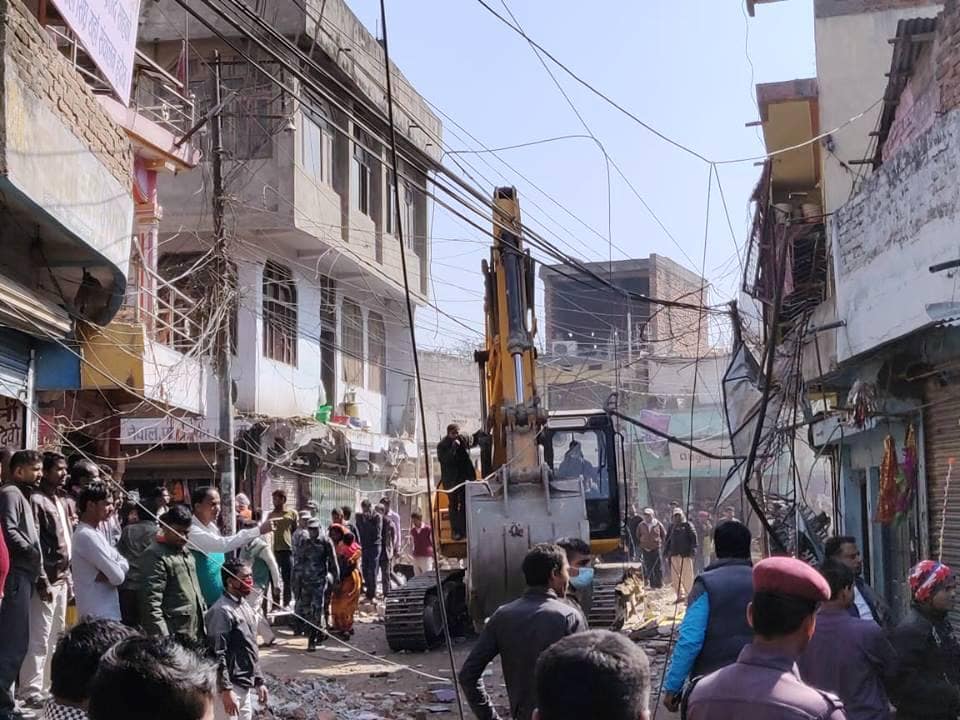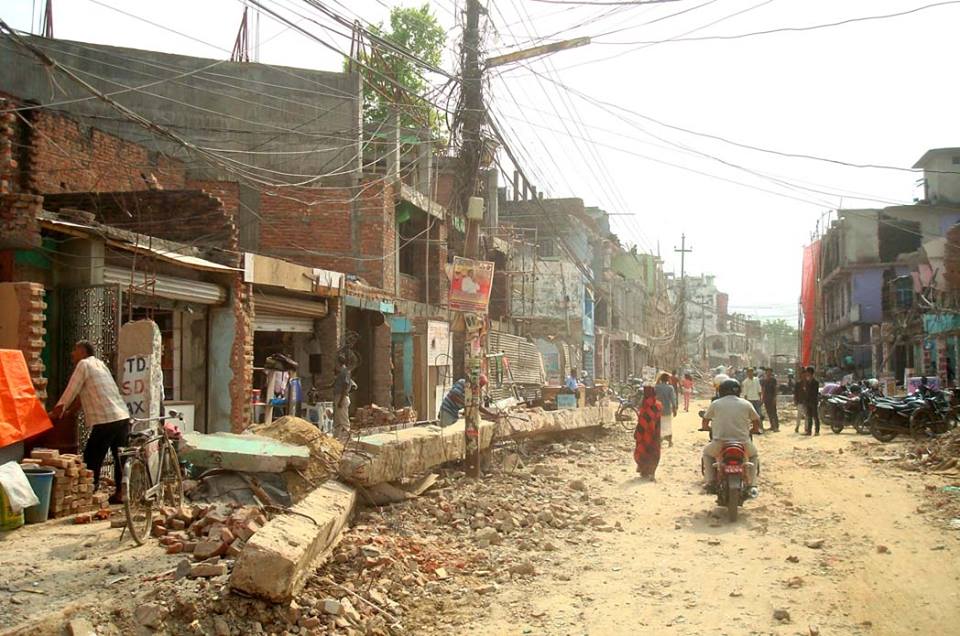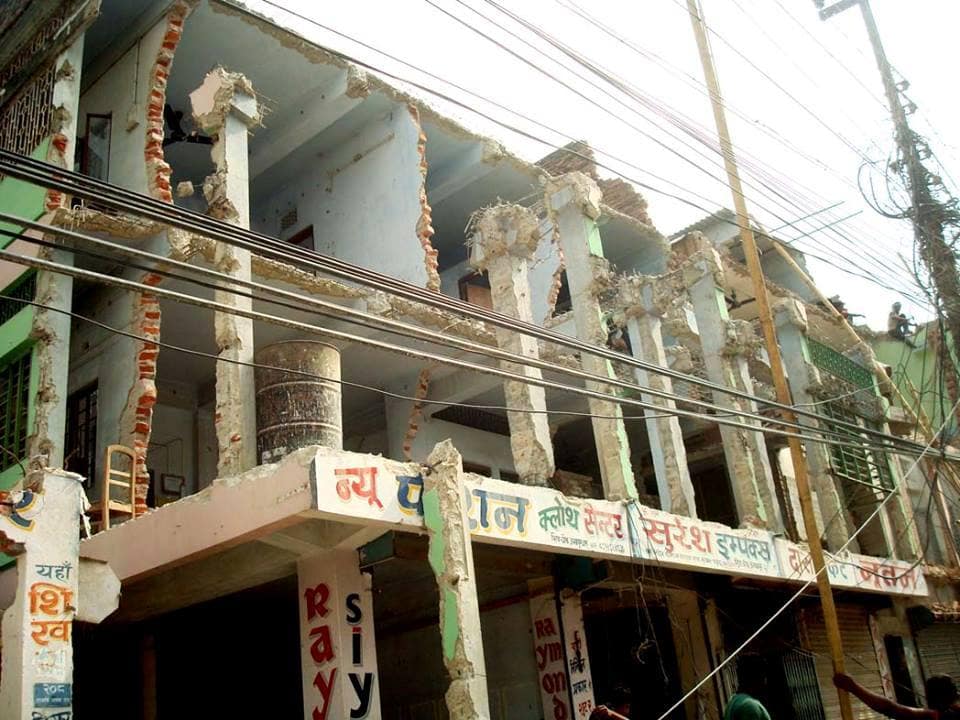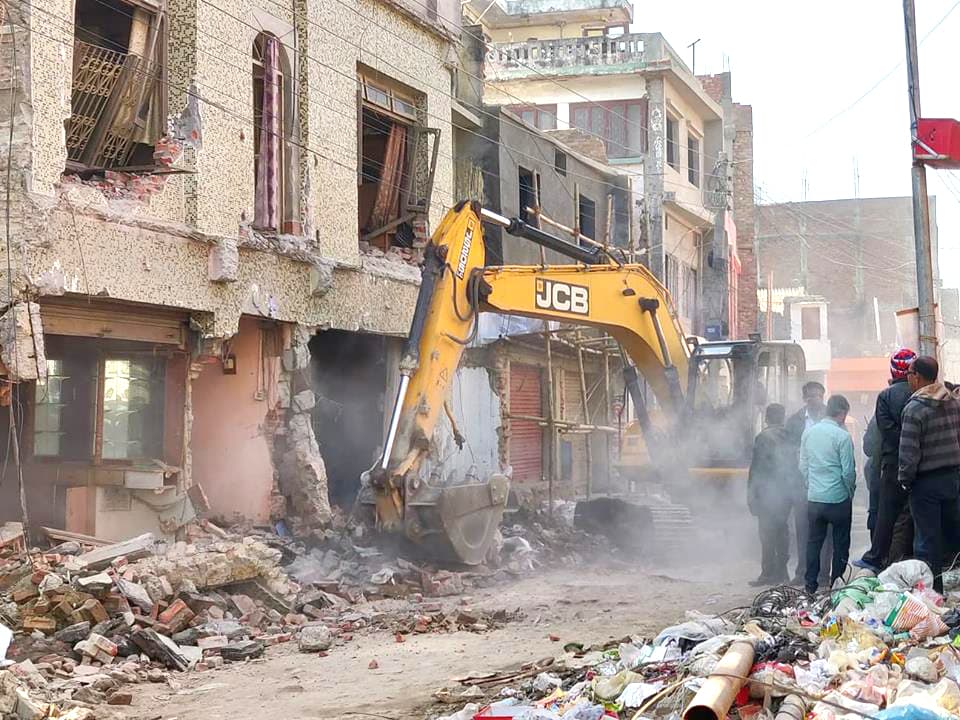During the construction of a 9 kilometre road and a 31-kilometre sewage worth Rs. 980 million, Janakpur Sub Metropolitan City damaged people’s property worth Rs. 10 billion. A deep dive into how and why this crazy ‘development model’ was adopted.
Ajay Anuragi: Centre for Investigative Journalism-Nepal
Until his death on December 22, 2018, Shiv Nath Sah of Janakpur Sub-Metropolitan City-4 worried the road expansion drive would cause demolition of his house. His house was demolished soon after his death. Sah had divided his property among his four sons Ram Chandra, Ram Kumar, Shrawan Kumar and Krishna Kumar. After the property division, he lived with his 70-year-old wife Bhagwati Devi in a makeshift home in a small plot of land. His wife was evicted from her home following the expansion of the road. “The Sub-Metropolitan City destroyed our house. Our father died in after worrying about it. Now our mother has been displaced,” said Krishna Kumar, one of the sons.

Shiva Chowk & Station Road in Janakpur
In fact, the family is among the evicted by the road expansion project. Each man had about 550 square feet of plot after the property division in the family. None has been able to build a house. After the municipality demolished their house, they submitted a letter to Rita Devi Mishra, the deputy mayor, seeking compensation and an alternative home for their family. But, nothing has been done so far. “No one will listen to the poor people like us,” Kumar said. The family had lost property worth Rs. 15 million due to road expansion campaign, according to his estimate.
Deepak Kumar Sah’s story is similar. His house, spread over 550 square feet in Janakpur Sub Metropolitan City-4, has been destroyed in the road expansion. His small plot was encroached upon by the road. Before it was demolished, he used to earn a living by running a pharmacy at the house. “Now only half the land is left. We cannot build a shop-front in it,” he said. According to Deepak, he lost the land worth Rs. 150 million and the house of Rs. 2.5 million.
Thakur Sah had built a house on his small plot of land in Janakpur Sub-Metropolitan City-4. The road expansion has left only a small patch. “My house was at the Chowk. After it was demolished, I became homeless. All in all, I lost property worth Rs. 20 million. What should I do now?” he said.
Funded by the Asian Development Bank, Integrated Urban Development Project, which the federal government started three years ago, has evicted hundreds of people in Janakpur. Until January 10, 2013, width of most roads in the city was 5 to 10 meters. However, on January 10, 2013, Jagannath Lamichhane, the municipality’s executive officer, launched a road expansion drive following a Municipal Council meeting. It fixed the width of road from the train station via Janak Chowk and Murali Chowk as 16 meters. Prior to that, the width was fixed at 13 meters.
The same meeting also decided that the road from Janaki Temple to Janaki Chowk and Mahavir Chowk will have to be 9 meters wide. But on June 23, 2018, the second meeting of Municipal Council decided the road to be 10 meters wide. Similarly, the road from Kadam Chowk to Janak Chowk was 13 meters wide. However, the Municipal Council meeting put its width at 16 meters. The people living alongside the road were evicted due to divergent criteria set for road expansion by local officials. This has incurred major damages to the property of locals. More than 2000 families have been affected by the project in Janakpur. “The project has encroached the land of two thousand families. Around 1500 houses have been demolished,” said Birendra Yadav, the project’s deputy manager and senior engineer at Janakpur Sub Metropolitan City.
The Integrated Urban Development Project was aimed at building physical infrastructure at Janakpur Sub Metropolitan City. It covers expansion of roads, construction of sewage and waste management. The Rs. 980 million project for construction of a 9 kilometer road and a 31-kilometre sewage was financed by Janakpur Sub Metropolitan City (20 percent), Asian Development Bank (25 percent) and the provincial government (55 percent). But, project hasn’t provided compensation for the affected people. Lal Kishor Sah, Mayor of Janakpur Sub-Metropolitan City, said, “Those who have suffered losses are not entitled to compensation because the local government doesn’t have funds. The federal government should compensate them. But it hasn’t happened.”
A bulldozer at ward chair’s house
Parameshwar Sah is the chair of Janakpur Sub Metropolitan City Ward-9. He had a concrete house in 7290 square feet of land near Pidari Chowk. He obtained a construction completion certificate on 1 October, 2013 from the municipality. He had left 26 feet 3 inches for the road while constructing the house. But, Janakpur Sub Metropolitan City demolished his house during the expansion drive.

This is how buildings on right and left of the road were demolished
On September 7, 2018, Mayor Lal Kishor Sah and Deputy Mayor Rita Devi Mishra were present at the scene when his house was demolished. The Sub Metropolitan City had also deployed police during the drive. Mayor Sah is elected from Rastriya Janata Party Nepal and Ward Chair Sah from Nepali Congress. “It’s illegal to demolish a house which has been approved by municipality. I asked them to show a paper before demolishing my house. The mayor refused to produce that,” Sah said. “They not only destroyed my house, they also arrested me, my wife, my brother and a nephew.”
He accused the mayor of initiating the demolition drive himself because protest he had protested against him over corruption at an executive board meeting. Half of his plot has been encroached by the road. He has spent Rs. 1.5 million to repair house damaged in the drive. About 182 square feet of land in Janakpur Pedari Chowk now costs Rs. 5 million. He said, “Due to road expansion, I have suffered loss of about Rs. 9 million.”
Others who have suffered losses due to road expansion have similar stories. The Sub Metropolitan City demolished Ramesh Kumar Sah’s house at ward-4 on March 8, 2019. Sah is former President of Janakpur Chamber of Commerce and Industry, his wife Madhvi Rani Sah is a former Constituent Assembly member. The Sah couple had built the house on 1093 square feet of land in Mahavir Chowk.
Despite that, they couldn’t save their home. The couple filed a case at Supreme Court, claiming that the Sub Metropolitan City had demolished their house without providing compensation. On November 15, 2018, a bench of justices Sharada Prasad Ghimire and Bom Kumar Shrestha ordered the municipality to extend of the road only after compensating them. But the court order hasn’t been implemented. The Shah couple has been preparing to file a case on disobedience of court. “When it comes to development, we don’t care about the court, deputy mayor Rita Devi Mishra said and ordered the demolition,” he said. But Mishra said she couldn’t read the court order as she had forgotten to bring her eye glasses. “We made mistakes. We won’t repeat it again,” she said.
Court’s disobedience
Ramesh Kumar Sah has also suffered losses of property from the road expansion project. He estimated that he needs 300,000 rupees to repair the house. “I suffered losses of 15 million rupees from the road expansion. My house was also damaged,” he said.
Earlier, the road in Co-station of Janakpur Sub Metropolitan City-1 was 42-feet wide. In July 2017, the Sub Metropolitan City introduced new criteria which put the width at 52.8 feet. It also ordered demolition of houses along both side of the road. Eleven people including Nirmala Devi Mahato, Vashistha Narayana Singh filed a case in the Supreme Court.
Justices Sharada Prasad Ghimire and Ishwar Prasad Khatiwada had issued a ruling which slapped a Rs. 5,000 fine to Jagannath Lamichhane, a former executive officer, for failing to reply to the questions from the court, and not furnishing an explanation. The court had issued an order to compensate people affected by expansion of the road. Nathan Lal Goenka, a local of Bhanu Chowk, said, “Angered by the petition filed by locals, the Sub Metropolitan City sent bulldozers to my house three times. But we could not do anything.”

A private property(house) demolished near Shiva Chowk by Janakpur Sub Metropolitan City
Vijay Kumar Jhunjunwala’s hotel was also damaged in the road expansion. He has run Hotel Welcome at his home in Shiva Chowk, at the heart of Janakpur. The drive encroached his 364 square feet of land. According to locals, 182 square feet of plot in the area costs from Rs. 7 million to Rs. 10 million. “The municipality sent bulldozers to residences in the name of development. As the bulldozer started to demolish my hotel, I did it myself to minimize the damage,” Jhunjunwala said.
He said he suffered a loss of Rs. 20 million. He spent Rs. 1.3 million on reconstruction of his hotel. “It’s a huge loss for a businessman to spent Rs. 21.3 million,” he said. There is no guarantee that the road will not be expanded again. Sandip Sah, a local, said, “The city officials are likely to make new criteria any day, and drive bulldozers in private homes.”
Prabhu Jalan is another local who has suffered losses from road expansion in Janakpur Sub Metropolitan City-1. According to his land deeds, he had 2369 square feet of land. Of that, 264 square feet was encroached in the expansion. The price of land per 182 square feet was Rs. 5 million. “I have suffered a loss of more than Rs. 10 million,” he said. He said he demolished his house himself to minimize the damage since the municipal bulldozers had weakened most buildings.
Jalan is a businessman of Janakpur. He had taken loans from the bank to do business, with his home as collateral. However, after the land area was reduced following the road expansion, the bank issued warnings to him. “When I took the loan, I had documents showing that my land covered 264 square feet. Now the area has been reduced. It’s now difficult to persuade the bank,” he said.
Rules and procedures routinely flouted
The law requires authorities to carry out an assessment before the launch of any development project. A public notice is mandatory before the acquisition of land. Affected people must be provided with compensation. Janakpur Sub Metropolitan City completed none of these procedures, yet expanded the road.

A house in Mahabir Chowk belonging to Ramesh Shah
People were not notified before the demolition. After Parameshwar Sah filed a petition at Dhanusha District Court, the court directed the municipality to present a copy of public notice on 24 March 2019. But, the municipality has not sent the letter until April 23, 2019.
Even after people lost their private land to the road, they are forced to pay land tax. As a result, landowners have been further victimised. They have been forced to pay tax for the previous land area. According to Kameshwar Raut, a survey officer in Dhanusha, the office database hasn’t been updated yet. “One needs recommendation of municipality to update the database. After receiving the papers, the Survey Office will update it,” he said.
The Sub Metropolitan City has not kept any record of the damage caused by road expansion. Experts estimate that damage to personal property could be in a few billion rupees. The project’s total cost stood at Rs. 980 million.
The project incurred a loss of at least Rs. 10 billion, according to an estimate by Jugal Kishor Labh, a retired engineer of Physical and Urban Development Division of Makwanpur. “The actual damage could be more than Rs. 10 billion. There was no rehabilitation plan for affected people. It was carried out in an authoritarian manner by keeping people in dark,” he said.
The Asian Development Bank had required the Sub Metropolitan City to compensate people before acquiring their land. However, the Sub Metropolitan City had said it did not have funds for it. Deputy Mayor Rita Devi Mishra was not willing to acknowledge that people’s property was damaged. “Their property was damaged. The fact was that they made some contribution for development. We could not compensate them because we didn’t have funds,” she said.
Ganga Prasad Yadav, chief divisional engineer of the Integrated Urban Development Project, said rules were flouted because the project would not have gone ahead if the donors were requested to provide compensation.
‘Mad model of development’
According to Birendra Yadav, an engineer of the Sub Metropolitan City, the construction of the 9-kilometer road has encroached on the land of 2000 people in Parikrama Road, Railway Station, Hanumanagadhi and Janaki Mandir. “When Jagannath Lamichhane was the executive officer, both sides were demarcated according to the map prepared in 1989. After that, the houses were destroyed according to the demarcation,” Yadav said. Around 40 percent of the houses were demolished by owners themselves and remaining 60 percent by the municipality, he added.
According to Yadav, 328,000 square feet of land has been encroached as part of the road expansion. A kaththa of land equals to 3645 square feet. A total of 90 kaththa of land has been encroached. The land in the main market area of Janakpur is expensive. According to Badri Jha, a technical engineer and former consultant of the project, the land price per 182 square feet (one Dhur) is over Rs. 2.5 million. According to the calculation, more than 5 billion rupees worth of land belonging to 2500 home owners have been damaged. The total cost reaches more than Rs. 10 billion if the cost of demolition and rebuilding is added to that.
Lalit Kumar Shah, the chairman of Janakpur Chamber of Commerce and Industry, said that project of Rs. 980 million had incurred a disproportionate damage to people’s property in Janakpur. “The expansion of the road has caused a huge disaster in Janakpur,” he said.
Prof. Dr. Surendra Labh, a development economist, said the project’s damage to private property was worth more than the funds of development project itself. “People’s drinking water pipes, electricity and telephone poles have been damaged. The mental stress is also huge. That’s why I’ve called it a mad model of development. A crime has been committed against the people in the name of development,” he said.
Jitendra Mahaseth, general secretary of Janakpur Chamber of Commerce and Industry has calculated the damage during the road expansion. It incurred the loss of Rs. 130 million in his estimate. According to Lalit Sah, chairman of Janakpur Chamber of Commerce and Industry, the project disrupted the trade in the city for about 6 months. “The trade was shut from mid-May to mid-November in 2018. We lost 780 million rupees during the period,” he said. Business community needs at least four years to recover the loss, he said.
The government bodies have also suffered damage due to road expansion. Underground water pipes were damaged during the drive. According to Vinod Mishra, head of Water Supply Office, water infrastructure worth Rs. 2 billion was damaged due to road expansion. “They uprooted the water pipes during the expansion. We couldn’t save the pipes. The contractors took them,” he said. Around 2000 customers have been deprived of drinking water for the last two years after pipes were damaged during the drive. The utility has also not received the revenue since then.
The infrastructure of Nepal Telecom has also been damaged in the road expansion. Its underground cables were destroyed. Its 7000 customers have not received the landline service for a year, according to Chinmaya Anand, head of Nepal Telecom in Janakpur. Raj Kishore Chaudhary, head of the outdoor repair section, said estimated loss from the drive could be around Rs 360 million.
The project’s deadline was extended several times since it began in January 2007. Its last deadline was mid-April, 2019, but the work remains incomplete. Deputy engineer and project manager Birendra Yadav said: “We are yet to build 50 meters of road and 1,000 meters of footpath.”
Land acquisition should be prioritized through talks: Supreme Court
1. The thrust of the Supreme Court rulings is that a mandatory condition of the law is that except in cases where a person relinquishes his land voluntarily, land acquisition should entail the compensation as per Land Acquisition Act. It should be complied with.
2. Fundamental rights have been enshrined in the Constitution to provide security of and compensation for legally earned and saved property of citizens.
3. Follow the Public Road Act, which says the boundary of road should be fixed only after acquiring land for the road.
4. The issue of depriving people from right of residence should be taken very seriously. Except in emergency situation, any act should not have an adverse impact on the safety of the housing.
5. Since holding talks is the easiest, most effective way to acquire land, a high priority to given to experts’ negotiation with the stakeholders for land acquisition.
(Full text of verdict by three judges of the Supreme Court, Kedar Prasad Chalise, Hiri Krishna Karki and Purushottam Bhandari in August 2018 in the case of Sanu Shrestha et all on September 18, 2017)



